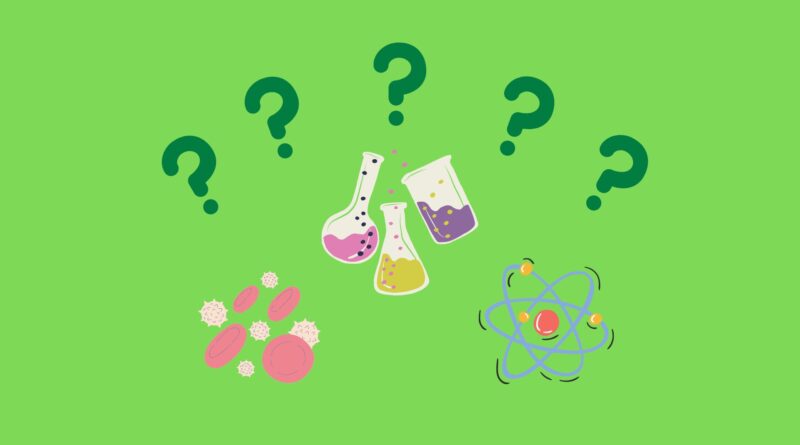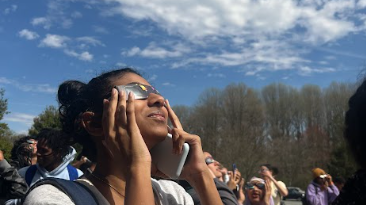Which Science Class is Right for You?
In MCPS, high school students must take three science credits in different focuses to graduate: one Life Science, one Physical Science, and one Other Science integrating Earth and space. In simpler terms, Blake students must take Biology, Chemistry, and Physics during their four years of high school. However, Blake has three different levels of challenge and engagement to fulfill these credits (On-Level, Honors, and AP), as well as a variety of science electives that you can take in addition to requirements. There is a structured schedule for freshmen, sophomores, and juniors to ensure students fulfill each requirement. Still, it allows students to have some choice in how challenging their classes are and decide which subjects they’re the most interested in.
Biology (9th or 11th)
You can choose whether to take biology during your freshman or junior year. If you take biology during your freshman year, you’ll take physics during your junior year, and vice versa.
On Level and Honors
Taught by: Ms. McMaster, Mr. Bryant, Ms. Felice, Ms. Friday, Mr. O’Connor
Like many core classes at Blake, you can choose what level you want to take in this course. Biology A/B is needed to earn credit, but if you want more acceleration and challenge in your classwork, you can also take Honors Biology A/B. The honors option comes with a boosted GPA, as honors classes in MCPS count for an extra grade point (so if you got an A in the class, it would count as 5.0 instead of 4.0). Both build upon prior science education and teach students about ecology, cytology, reproduction, genetics, scientific evolution, and taxonomy. Another thing to keep in mind is that when you take biology, you’ll also take the Maryland Integrated Science Assessments or the MISA. This assessment is one of a group of standardized tests that, in addition to coursework, are required for graduation. While this test isn’t necessarily difficult, it integrates what you learn in your high school biology course, so it’s important to remember this test when planning which year you want to take biology.
Advanced Placement
Taught by: Ms. Saikh
While technically counting as an elective science course, AP Biology also fulfills the biology requirement. This class is available to juniors and seniors and prepares students for the AP Biology Exam in May, which they may earn college credit depending on their score. As a double-period class, you’ll have two consecutive class periods to learn instruction and conduct labs or experiments. Additionally, this class counts for one full credit each semester rather than 0.5. Since this is an Advanced Placement course, you’re bound to get more homework and be required to process more information in a shorter period. Due to this, the class is recommended for students who want to pursue careers in biology or biology-related fields.
Chemistry (10th)
On Level and Honors
Taught by: Ms. Cheung, Ms. Friday, Mr. Keil, Ms. Zanni
Almost every student at Blake takes their chemistry credit during their sophomore year. In this class, you can work with different chemicals and perform labs and experiments that you wouldn’t normally do in your biology or physics classes. The honors option comes with a boosted GPA, as honors classes in MCPS count for an extra grade point. Topics include classifying matter, heat and molecular motion, chemical bonds, and the properties of matter. Students get to experiment with heat and reactions, gather data from the stream outside at Blake, and do other activities to strengthen their understanding of basic chemistry.
Advanced Placement
Taught by: Ms Zanni
Like AP Bio, this class is an elective science option that fulfills your chemistry requirement. AP Chemistry is most often taken by seniors or sophomores ready for an extra challenge and also provides the chance to earn college credit from the exam in May. This course is also a double period, which allows for plenty of practice with chemical equations and extensive labs. Topics include atomic theory, phases of matter, chemical bonding, solutions, and other skills that ensure students have great preparation for a college-level chemistry course. Also like AP Bio, this class counts for one full credit each semester rather than 0.5.
Physics (9th of 11th)
Like biology, you can choose whether to take physics during your freshman or junior year. Many students are recommended by teachers to take biology first, then physics, but both pathways effectively fill your requirements and put you on track to graduate high school.
On level and Honors
Taught by: Mr. Cornell, Ms. Frank, Mr. O’Connor, Ms. Coles
Like other science classes, you can choose what level you want to take in this course. Only Physics A/B is needed to earn credit, but for a more challenging and engaging experience, you can also take Honors Physics A/B. The honors option comes with a boosted GPA, as honors classes in MCPS count for an extra grade point. The first semester of physics includes topics such as energy, momentum, dynamics, and vector mathematics, and the second semester features electricity, waves, and thermodynamics.
Advanced Placement
Taught by: Ms. Coles
Unlike the other AP science classes, you have two options for physics: AP Physics 1 and AP Physics C. AP Physics 1 is a more introductory class that builds off of previous Geometry and Algebra 2 classes. AP Physics, on the other hand, requires more experience in calculus courses. Topics include vectors, kinematics, particle dynamics, momentum, collisions, gravitation, and planetary motion. Each AP Physics course counts as 1 credit and contributes to your weighted GPA, just as an honors class would. These classes prepare students for the AP Physics exams in May and are recommended for students who want to pursue physics-related fields after high school.
Electives
In addition to core science classes and their respective electives, Blake also offers two additional science electives: Anatomy and Physiology, and Environmental Science. These courses don’t contribute to your graduation requirements but are encouraged for students who are interested in science beyond the three classes taken from freshman to junior year. These classes are commonly taken by seniors who have fulfilled their required credits but can be taken by anyone.
Anatomy and Physiology
Taught by: Ms. McMaster
This class is like an additional biology class focused on the systems of the human body. The first semester topics include cells, tissues, and the nervous, skeletal, and muscular body systems. The second semester focuses more on the circulatory, excretory, endocrine, and reproductive systems. One thing to note is that dissection is required in this class, so if you’re faint of heart or don’t find the idea appealing, this class might not be for you.
Environmental Science (On-level and AP)
Taught by: Mr. O’Connor
Environmental Science A/B overviews global ecosystems, atmospheric processes, and the hydrosphere and biosphere. The first semester discusses geology, energy flow, chemical cycles, population studies, and pollution. The second semester focuses on land and water use, energy, and food and natural resources. AP Environmental Science builds on these topics, with more detail and more lab experiments and procedures. This class involves more work outside than any other science class here, which is another thing to keep in mind when deciding whether or not this course is for you.
Now that you know all of your options, you hopefully feel prepared to register for classes on December 13! All of these options are incredible, whether they’re required or optional. Hopefully you consider taking a few science electives next year!




